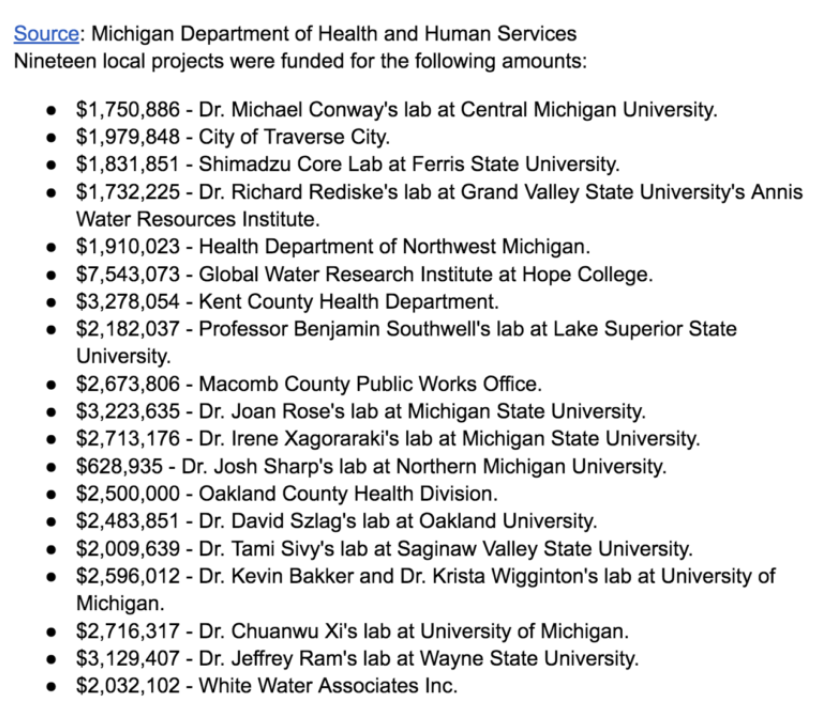By Barbara Bellinger
Capital News Service
State officials are publishing data from 19 Michigan sewage treatment plants and more than 400 wastewater collection systems to create an early warning system for COVID-19 outbreaks.
The wastewater monitoring dashboard went live the week of Dec. 6 on the Michigan Department of Health and Human Services wastewater website.
The Sentinel Wastewater Epidemiology Evaluation Project – SWEEP, for short – consolidates COVID-19 data from 17 counties and Detroit.
“The monitoring increases virus detection and provides an early warning that someone is infected in the community,” said Chelsea Wuth, the associate public information officer for the state Department of Health and Human Services.
Michigan’s public health programs have battled the virus through contact tracing, vaccinating and setting up testing centers, said Joan Rose, the co-director of the Centers for Water Sciences and Advancing Microbial Risk Assessment at Michigan State University.

19 funded local wastewater treatment projects. Source: Department of Health and Human Services.
“We’ve not been prepared,” Rose said. “It’s been a tremendous effort for a small community to try to implement something like this, let alone a state, let alone a nation.”
The wastewater monitoring will not supplant efforts to combat COVID-19 but complement them and hopefully take some of the burden off the overloaded public health system, Rose said.
“We’re getting a whole picture now,” Rose said. “Where is the virus trending up? Where is it trending down? Where do we need to mobilize more testing? Get more people tested? Where do we need to get more communication out?”
Hope College in Holland began daily monitoring of wastewater for the virus at nine zones serving campus housing in August 2020, said Aaron Best, a professor of genetics and lead scientist on the college’s wastewater monitoring project.
“The idea was to be able to anticipate when people had COVID-19 before they knew that they had it,” Best said.
“We’d been back in session for about a month when we had our first event,” Best said. “We were able to test students in that zone.”
They found five COVID-19 cases and all of the students were asymptomatic. Through quarantine and isolation, the college prevented what could have led to their first outbreak of the year, Best said.
“That was the first indication to us that it would actually work,” he said. “It definitely showed us that in a residential setting, a congregate living facility, that this kind of approach can work and does work, if you’re willing to do the follow-up.”
The college reported testing results, quarantine measures and subsequent “all clear” to the Ottawa County Health Department.
That gave the health department the confidence to not put the college into a two-week lockdown or a virtual attendance situation, Best said. Last June, the college received a $7.5 million state grant to continue monitoring and expanding the program across southwest Michigan.
It’s not the only one.
The Department of Health and Human Services awarded close to $49 million to 19 organizations and institutions across the state. Through this funding, Michigan’s COVID-19 wastewater monitoring will cover more than 400 locations across 55 counties and Detroit, state health department officials said.
Traverse City received $1.9 million, Macomb County Public Works received nearly $2.7 million, Lake Superior State University in Sault Ste. Marie was awarded $2.1 million and Michigan State received $5.9 million, to name a few.
Rose’s team is working in a community where, through wastewater testing, it has been able to narrow down to two locations that are driving the infection rates up: the casino and the hospital.
“So people that are really sick end up, of course, at the hospital,” Rose said. “But maybe at the casino there’s more they can do about social distancing and mask wearing. Is there some way to prevent spread at that location?”
Through testing, Rose has also been able to determine a direct link between percent of vaccinations and instances of COVID-19 in wastewater.
“We’ve got a relationship now between the decreasing virus numbers in the wastewater and the increasing percentage of students that are vaccinated at MSU campus,” Rose said.
The Great Lakes Water Authority is monitoring wastewater systems in Detroit and large areas of Oakland, Macomb and Wayne counties. It is going to identify COVID-19 cases by zip code.
“If we can tie it back to local areas, get it down to zip code level, then we can start to say, ‘Well, there’s a little hotspot here. Let’s get those signs and warnings out: Hey, guys, wash your hands. Wear a mask. Be careful,’” said John Norton, director of energy, research & innovation at the Water Authority
“We are trying to take care of our people,” Norton said.
“I know that the public is getting COVID fatigue. But the fact is that there’s a lot of folks that are working really hard to try to figure out how to do better in the future so that we don’t have such things.”